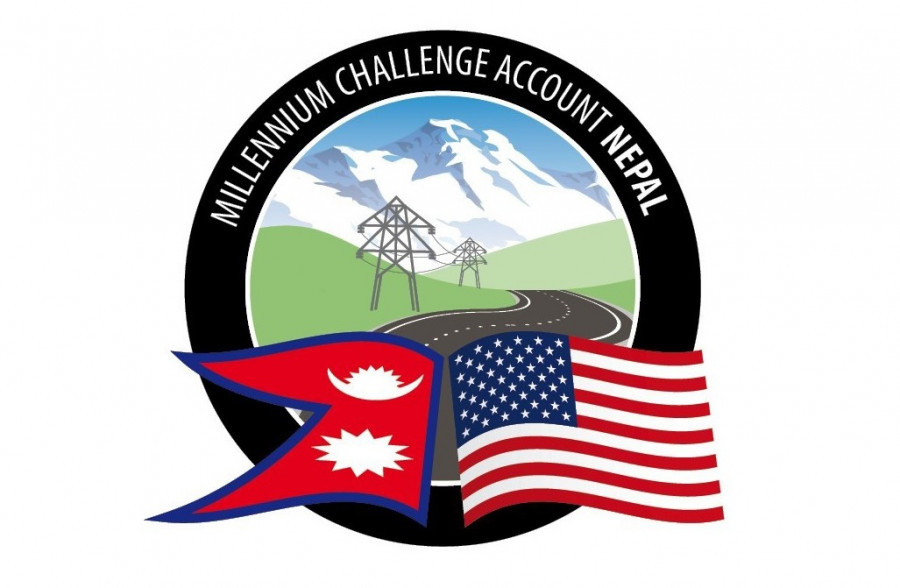National
Private sector wants MCC compact endorsed from Parliament
Amid controversy surrounding the US aid, three trade associations say the programme has economic benefits for Nepal.
Prithvi Man Shrestha
Three major private sector bodies on Wednesday urged the government, political parties represented in Parliament, civil society and other stakeholders to implement the Millennium Challenge Corporation compact, arguing that the US aid has economic benefits for the country.
The Federation of Nepalese Chambers of Commerce and Industry, Confederation of Nepalese Industries, and Nepal Chamber of Commerce said in a joint statement that the MCC programme should be implemented after endorsing it from Parliament as it could provide an opportunity for Nepal to export power (following the construction of transmission lines) in the long run, besides benefitting the country with new technology. Construction of transmission lines and the maintenance of a part of the East-West Highway are major components of the American assistance.
It is for the first time that the private sector has jointly endorsed the MCC, which has become a lightning rod of controversy in Nepal, with political parties deeply divided over the programme. With social media full of angry outbursts against the MCC compact, hardly any political party, civil society group or business bodies have spoken in favour of endorsing the US aid lately.
Shekhar Golchha, president of the federation, said that the private sector welcomed the MCC programme for Nepal as the projects being implemented under the compact are important for the country. Under the aid, a 315km long 400KV transmission line will be built and road improvement will be carried out.
“These projects are crucial for reducing the cost of doing business in Nepal and exporting surplus energy [to India] as well,” said Golchha. He also praised the MCC compact as the most transparent aid programme.
Such a response from the private sector comes nearly a month after a delegation of the MCC led by its vice-president, Fatema Z Sumar, visited Nepal and held discussions with political leaders, government officials, private sector and civil society representatives seeking facilitation in endorsing the US aid programme from Nepal’s parliament.
“During the meeting with the private sector representatives, the US delegation had called for support to the US compact if they thought it was required for the country,” said a source at the Millennium Challenge Account, Nepal, a government entity formed to implement projects under the MCC.
Golchha, however, insisted that nobody had influenced the private sector’s joint response regarding the MCC on Wednesday. Asked why the private sector spoke on the matter now, Golchha said they didn’t want the transmission line project to meet the fate of Arun III hydropower project.
In the early 1990s, the World Bank had pulled out of the Arun III project following protests by the CPN-UML.
In their statement, the private sector bodies said that the completion of a transmission line and road repair work under the MCC compact would aid Nepal’s economic growth.
“Due to Covid-19, internal resources have been constrained, and foreign aid has not increased as expected. Foreign investment decreased by 49 percent in the first month of the current fiscal year [2021-22]. In this situation, the $500 million US aid is important for Nepal,” the statement reads.
They said that the activities related to infrastructure development, economic growth and employment creation should not be affected.
Nepal government and the MCC signed an agreement in September 2017 to implement the MCC compact in Nepal. Tabled in 2019, the MCC agreement is stuck in Parliament due to a controversy. Without parliamentary approval, the MCC compact cannot move ahead with implementation.
During the visit to Nepal in early September, the MCC delegation reminded Nepali leaders that it was high time to endorse the compact as four years had passed since the agreement was signed.
“Now is the time to act and decide whether you want to go with the MCC Nepal compact,” Sumar had told journalists before wrapping up her visit.
The programme has run into controversy over some concerns raised by some political parties including whether it supersedes Nepal’s laws, whether it has any military connection, and whether the US would control the rights over the intellectual property generated through the implementation of projects.
A day ahead of Sumar’s visit to Kathmandu, the MCC headquarters had clarified Nepal’s concerns saying that it neither supersedes Nepal's constitution nor does it have any military connection.
Sumar reiterated at the press meet that the programme has zero military component and there “are no strings attached”.




 13.12°C Kathmandu
13.12°C Kathmandu














